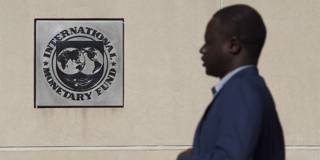The 75th anniversary of the Bretton Woods agreement and the departure of Christine Lagarde from the helm of the International Monetary Fund represent a golden opportunity to put the institution on a path toward a more effective and inclusive future. What should her successor's priorities be?
NEW YORK – This month marks the 75th anniversary of the signing of the Bretton Woods agreement, which established the International Monetary Fund and the World Bank. For the IMF, it also marks the start of the process of selecting a new managing director to succeed Christine Lagarde, who has resigned following her nomination to be European Central Bank president. There is no better moment to reconsider the IMF’s global role.
The most positive role that the IMF has played throughout its history has been to provide crucial financial support to countries during balance-of-payments crises. But the conditionality attached to that support has often been controversial. In particular, the policies that the IMF demanded of Latin American countries in the 1980s and in Eastern Europe and East Asia in the 1990s saddled the Fund’s programs with a stigma that triggers adverse reactions to this day.
It can be argued that the recessionary effects of IMF programs are less harmful than adjustments under the pre-Bretton Woods gold standard. Nonetheless, the IMF’s next managing director should oversee the continued review and streamlining of conditionality, as occurred in 2002 and 2009.

NEW YORK – This month marks the 75th anniversary of the signing of the Bretton Woods agreement, which established the International Monetary Fund and the World Bank. For the IMF, it also marks the start of the process of selecting a new managing director to succeed Christine Lagarde, who has resigned following her nomination to be European Central Bank president. There is no better moment to reconsider the IMF’s global role.
The most positive role that the IMF has played throughout its history has been to provide crucial financial support to countries during balance-of-payments crises. But the conditionality attached to that support has often been controversial. In particular, the policies that the IMF demanded of Latin American countries in the 1980s and in Eastern Europe and East Asia in the 1990s saddled the Fund’s programs with a stigma that triggers adverse reactions to this day.
It can be argued that the recessionary effects of IMF programs are less harmful than adjustments under the pre-Bretton Woods gold standard. Nonetheless, the IMF’s next managing director should oversee the continued review and streamlining of conditionality, as occurred in 2002 and 2009.